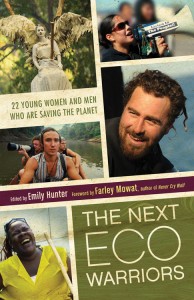The Next Eco Warriors
Edited by Emily Hunter
Foreword by Farley Mowat
Reviewed by, Yvonne Bambrick for Alternatives Journal
(Originally posted May 9, 2011)
The Next Eco Warriors is a powerful collection of first person accounts of environmental struggles being fought by young activists from around the globe. Although they vary widely in focus, strategy and outcome – from oceans, to mining, to deforestation – the central theme concerns every living being on Earth. There is a very real fight happening right now to save an angry and dying planet before it’s too late.
Through her opening and closing words in this collection, editor Emily Hunter demonstrates clearly that, as the daughter of Greenpeace founder Robert Hunter, she is living and breathing her father’s lasting environmental legacy, while also making the case that our next generation of eco-warriors has come of age to be smarter and even more determined than its predecessors. The stakes are higher than ever and these young people are fighting for our lives.
While reading of the endless environmental violence detailed in this collection, I was often reminded that much of humanity has a fundamentally flawed and ego-based perspective on life and all that sustains it. Many, if not most, see humans as “apart fromâ€, as opposed to “part of†the planet and all life upon it. As we have historically viewed unknown human cultures as lesser and exploitable, so to do we judge, abuse and misinterpret the language and lives of the fauna and flora essential to the fragile connective tissues and sustainability of Earth’s land and sea and air.
The Eco-Warriors in this book are people who have made this link, have had their eyes opened to the web of natural systems and the role humans are playing, and can no longer sit idle while humanity stampedes ahead in the name of progress and growth and “the economyâ€.
“…in realizing our interconnectedness, we need to unlearn the individualism we’re taught in this country (US). We need to relearn the responsibility of community.†Enei Begaye, p. 238
These stories tell of remarkable catalyst moments that seeded activism. Several highlight the COP 15 Climate Change Conference in Copenhagen as a pivotal period that not only highlighted the urgency with which we must address climate change, but that we must mobilize millions of citizens around the globe to fight for the defining cause of our time.
While I have strived for my work to have a positive impact on the planet, I’ve often felt that my efforts were too insignificant, small and localized. This book makes it abundantly clear that it actually takes many hundreds of thousands of efforts, small, medium and large, individual and collective, within and outside of governing systems, to have an important and transformative influence on society if we are to actually slow climate change.
Although the stories presented in this collection tell of success, they also recount actions that raised awareness and connected community but failed in their purpose: Carcinogenic chemicals continue to be sprayed onto communities; poorly managed garbage incinerators are expanded to burn unsorted community rubbish full of recyclable material; the seal hunts, shark finning, and dolphin kills; and shamefully wasteful global practices that go on despite evidence of inhumane actions and sustainable alternative options.
“The reality is heroes don’t win the revolutions. It is ordinary people doing the extraordinary…. only when we take up the battle is there truly a fighting chance for that world.†Emily Hunter p. 253
We rarely if ever hear of environmental actions being undertaken outside of North America and the European Union. Ms. Hunter’s collection is truly global in its reach and all the more inspiring for it. This powerful collection of stories of great human spirit is accompanied by a resource guide and a website and growing online community.
Be warned! Reading these stories will likely compel you to take action if you are not already doing so. While aimed at young people, even the most dedicated environmental champion will learn from the individuals profiled in this book. It will not only provide new insight into our global struggle for survival; it offers encouragement and evidence that one person can play a profound and vital role in this battle, all while having fun, falling in love, developing practical skills and building community.
(Book published by Conari Press, San Francisco, 2011. 253 pages.)
Yvonne Bambrick is a life-long year-round cyclist/photographer, and recently served as the founding executive director of the Toronto Cyclists Union, her hometown’s first city-wide cycling advocacy organization. When not pedaling around town, she’s also the co-ordinator of Pedestrian Sundays in Kensington Market and the Kensington Market BIA.
